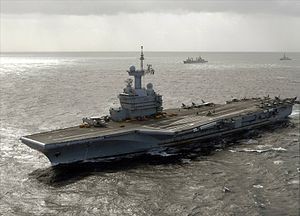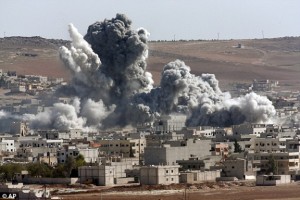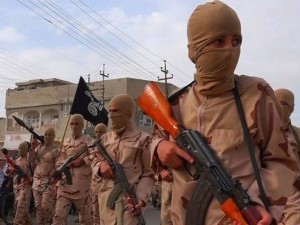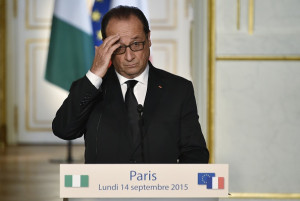“French President Francois Hollande told his shell-shocked nation Saturday morning the carnage Friday night in Paris was an ‘act of war’ committed by the Islamic State of Iraq and Syria (ISIS). Less than an hour later, ISIS released its official statement claiming responsibility for the onslaught.” — CBS News
As of Saturday afternoon, Paris time, casualty numbers are still fluctuating, but French authorities estimated about 128 dead and 200 injured, half seriously. ISIS said the attack was carried out by 8 people. If so, all were apparently killed, because French police killed 2 during a SWAT assault to free theater hostages and said there were 6 suicide bombers. Nevertheless, France is mounting a massive manhunt for any possible surviving terrorists.
It’s unclear what military actions France will now take against ISIS; it was already bombing ISIS positions in Syria. The French military has a single modern U.S. Nimitz-type aircraft carrier at its disposal.
The attacks seem likely to be a game changer for European policy toward ISIS, and for the U.S. presidential campaign as well.
 ISIS, a cult-like Arab Islamic movement led by a Sunni religious figure that seeks to establish a medieval caliphate on territory of Syria, Iraq, and Iran, and which first gained worldwide notoriety by committing brutal and intentionally publicized atrocities, seems either bent on self-destruction or consumed by megalomania. It claims jurisdiction over all Muslims worldwide, and overtly intends to displace and replace existing Islamic-world governments.
ISIS, a cult-like Arab Islamic movement led by a Sunni religious figure that seeks to establish a medieval caliphate on territory of Syria, Iraq, and Iran, and which first gained worldwide notoriety by committing brutal and intentionally publicized atrocities, seems either bent on self-destruction or consumed by megalomania. It claims jurisdiction over all Muslims worldwide, and overtly intends to displace and replace existing Islamic-world governments.
ISIS likely was behind the probable bombing of a Russian airliner filled with vacationers, many of them children, which if verified almost certainly will lead to intensified Russian intervention against ISIS. Russia is already supporting Syrian dictator Assad with airstrikes, although until now those actions have been directed more against Assad’s opponents in Syria’s civil war than against ISIS per se. ISIS is associated with genocide, mass executions, slavery and rape, terrorism and war crimes; and approximately 60 countries already are waging war against it in some degree and manner.
Friday night’s Paris attacks, which probably were retaliation at least in part for French airstrikes against ISIS in Syria and Iraq, targeted crowds at a soccer match, an American band’s concert, and bistros. America also has been bombing ISIS, and on Thursday claimed it had killed the face of ISIS murder, “Jihadi John,” so the United States is a logical terror target for the group as well.
Even though ISIS hasn’t struck U. S. soil yet — although it has brutally executed a few Americans who fell into their hands in the Middle East — much of the American public probably now anticipates such an attack, and this will affect the presidential race. With the problem of ISIS now leapfrogging to the top of the foreign policy agenda, and defeating ISIS likely to be a major focus of the next administration, the candidates will be under pressure to outdo each other in the aggressiveness of their policy proposals, especially on the Republican side.
 Overall, the discussion of U.S. policy toward ISIS is likely to assume an even greater military character now. Among other things, U.S. “boots on the ground” has become more likely, and the attack against random French civilians is likely to make Americans more receptive to the idea of the United States becoming involved in another Middle East ground war, as the public is more likely now to view such a war as both inevitable and necessary. I foresee a major U.S. military commitment against ISIS occurring now, allied with France and other countries.
Overall, the discussion of U.S. policy toward ISIS is likely to assume an even greater military character now. Among other things, U.S. “boots on the ground” has become more likely, and the attack against random French civilians is likely to make Americans more receptive to the idea of the United States becoming involved in another Middle East ground war, as the public is more likely now to view such a war as both inevitable and necessary. I foresee a major U.S. military commitment against ISIS occurring now, allied with France and other countries.
ISIS appears to be picking fights with the whole world, in a manner slightly reminiscent of Hitler’s multi-front war in Europe, but unlike ISIS he had the resources of a large industrial nation at his disposal, and a realistic chance of winning. And even Hitler, with his much greater resources, didn’t attack his enemies all at once. He sought to defeat them piecemeal, by first grabbing Poland (the eventual springboard for an invasion eastward into Russia and the Ukraine), then taking out France and occupying continental Europe and north Africa, and finally by attacking the Soviet Union. Although he came close to success, he ultimately was defeated after the Western Allies and Soviets ganged up on him, and overwhelmed his industrial and military machine by attacking him from all sides.
It’s harder to figure out ISIS’s strategy, or if it even has one. Its stated broad aim is to assert political and religious authority over Muslims everywhere. It has proclaimed a worldwide caliphate, which implies world domination, and it’s hard to see how it could achieve that under any circumstances.
ISIS differs from other terror groups, in that it has some state-like characters: It controls some territory, claims governing authority, and has something resembling a conventional (albeit small) army. But it’s a far smaller entity than the Nazi Reich was, and operates from a much smaller territory with a many-times-smaller population base of about 8 to 10 million people (not all of whom are supporters or under their control), and although it has captured some oilfields it lacks an industrial base and the resources of a modern state.
 Its ragtag army of 15,000 to 20,000 fighters is cobbled together from disparate rebel and insurgent elements, about half of whom are foreigners, and is equipped with mostly light weapons scrounged from Saddam’s stockpiles or captured in Syria’s fighting. Roughly half its fighters are foreigners (i.e., non-Iraqis; in nationality terms, ISIS is primarily an Iraqi insurgent group), with the largest contingents from Tunisia, Saudi Arabia, Russia, Jordan, and Morocco; somewhat surprisingly, there’s also a fairly large group (about 1,200) from France, and nearly 200 from America — and nearly as many from Sweden (300) as from Egypt (360).
Its ragtag army of 15,000 to 20,000 fighters is cobbled together from disparate rebel and insurgent elements, about half of whom are foreigners, and is equipped with mostly light weapons scrounged from Saddam’s stockpiles or captured in Syria’s fighting. Roughly half its fighters are foreigners (i.e., non-Iraqis; in nationality terms, ISIS is primarily an Iraqi insurgent group), with the largest contingents from Tunisia, Saudi Arabia, Russia, Jordan, and Morocco; somewhat surprisingly, there’s also a fairly large group (about 1,200) from France, and nearly 200 from America — and nearly as many from Sweden (300) as from Egypt (360).
ISIS’s forces have been able to wreak havoc on the unarmed civilian populations it has overrun, but are no match for the major powers or superpowers; by any logic, it couldn’t hope to survive much less win the all-out war it seems to be trying to provoke. Thus, from this distance, the group’s aggression against the civilized nations appears to be suicidally insane. But there’s no doubt it’s calculated, even if madness.
Its deepest roots lie in the Sunni Iraqi minority who ruled Iraq during the Saddam era but were displaced by the 2003 U.S. invasion. Formed in 1999, ISIS joined in fighting American troops during the Iraq War; and it has fought both sides of Syria’s civil war. Its top military commander was one of Saddam’s colonels. ISIS has tried to grow via mergers with other groups, but it broke with al Qaeda and those two groups are now enemies. ISIS has no overt state sponsors, but is believed to get under-the-table support from Turkey and Saudi Arabia, among others, whose governments vehemently deny aiding ISIS. There is no doubt that significant support flows to ISIS from citizens of those countries and many others in the Islamic crescent.
